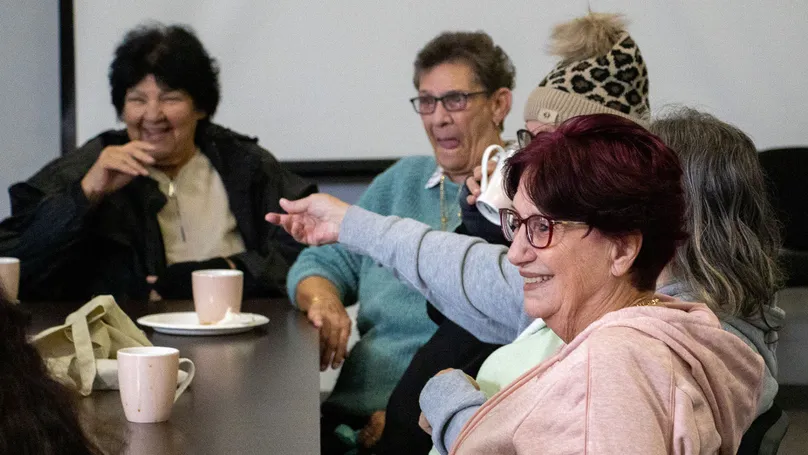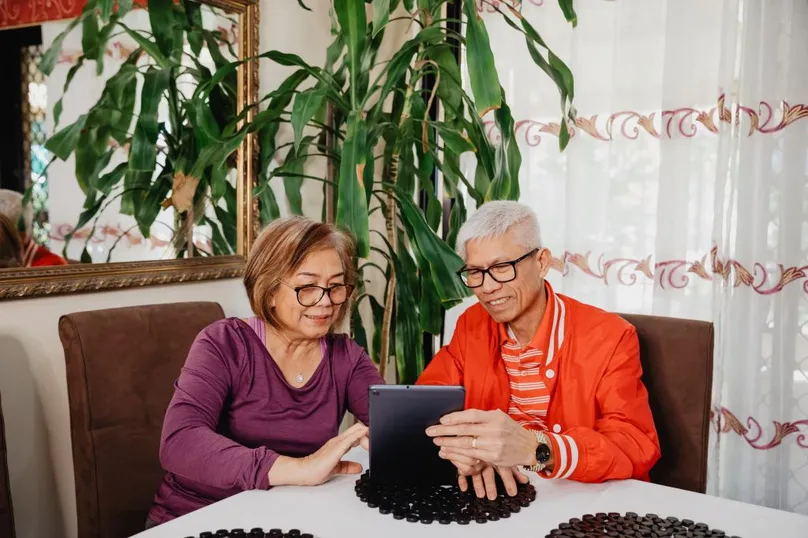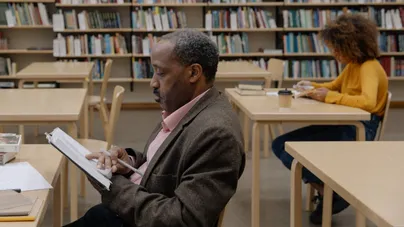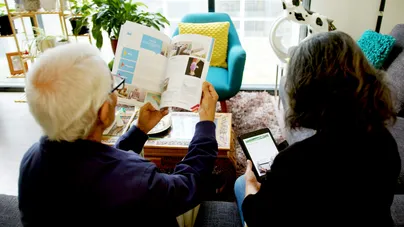Staying socially connected supports your mental health, physical health, and brain health. Your community is one of your greatest assets.

Being part of a community gives you a support network and a sense of belonging. But did you know that belonging is a basic human need that affects your overall health?
In fact, research shows that strong social connections are just as important for your health as eating well, staying active, or getting enough sleep.
It’s important to keep building and nurturing connections as you age. Reaching out to others can bring joy, comfort, and lasting health benefits.
Why social connection matters for health
Staying connected can:
- Reduce stress and help you manage pain
- Support your physical health and reduce your risk of chronic disease
- Improve your memory and lower your risk of dementia
How does staying connected help you manage stress?
When you stay connected, it’s easier to talk about your feelings and feel supported. This relieves stress and helps build emotional resilience.
Being resilient means you’re better able to cope with life’s ups and downs. This includes challenges with health, pain, or other difficult times.
Limited social networks, on the other hand, are linked with higher levels of stress and depression.
Both the quality and quantity of your relationships matter in later life.
A wide social network can:
- Provide access to varied types of support
- Offer more opportunities for social and physical activity, which can boost your mood
Meanwhile, close friendships can:
- Provide deep emotional comfort
- Offer steady support during tough times
How does feeling supported help you manage pain?
Chronic pain doesn’t just affect your body. When you’re dealing with discomfort or fatigue, it’s easy to withdraw from the things you love. But staying socially engaged could be part of what helps you feel better.
Spending time with others and feeling supported can make it easier to cope with pain. Researchers from the University of Western Australia found evidence that strong social support can make pain feel less intense. According to research from the Australian National University, this effect is often due to how social connection buffers stress.
But it also helps that being around others can encourage habits that help reduce pain even further, like exercise.
Take Bill, 76, for example. He lives with chronic back pain and had stopped going to his walking group. A friend encouraged him to come just for the coffee afterwards. 'I missed the people more than the walking,' he says. 'Even chatting helps take my mind off the pain.'
That feeling of support helped shift Bill’s mindset. It gave him some relief from the pain and encouraged him to get out of the house now and then. Over time, this made it easier for him to rejoin the group for walks – a routine that keeps him moving, lifts his mood, and supports his overall health.
If pain or fatigue is getting in your way, you’re not alone. Some readily available assistive products may help you stay socially active and do more of what you enjoy.
Explore assistive technologyHow does community involvement support your physical health?
Staying socially active keeps you moving and helps protect your long-term physical health.
The World Health Organization says that being socially isolated can be just as bad for you as smoking or being very overweight. All three can raise your risk of serious health problems and shorten your life expectancy.
Once again, these benefits may come down to how social connection helps to:
- Reduce stress
- Encourage healthy behaviours like walking
Both effects can protect you from health conditions, such as high blood pressure. In fact, a study from the University of North Carolina found that, for older people, being socially isolated was worse for blood pressure than having diabetes.
How does social engagement support your brain health?
Staying socially active keeps your brain engaged and supports your memory in multiple ways. For one thing, supportive relationships protect your brain from the negative impacts of stress and depression. For another thing, socialising can be a complex mental exercise, which helps you build cognitive reserve.
Multiple studies show that older adults who maintain strong social ties tend to have:
- Slower memory decline
- Better thinking skills
- A lower risk of dementia
This especially applies if your social life is maintained through active connections such as:
- Meaningful friendships
- Community groups
- Volunteering
So, why not join a social club or volunteer group today? You can meet likeminded people and protect your brain health for the future.
Feeling lonely? Support is available
If you’re feeling lonely or isolated, you’re not alone – and there’s help available.
Programs funded by the Australian Government can connect you with local groups or services to help you feel more engaged and supported.
You can talk to your GP or explore services such as the Aged Care Volunteer Visitors Scheme.
Find support for lonelinessReady to connect? LiveUp can help
Staying connected is part of maintaining good health. And it's never too late to connect with your community.
Ready to start connecting but not sure how? LiveUp has you covered with practical tips for taking small steps towards meaningful connections.
Explore ways to connectStart connecting today! Explore LiveUp’s social activities database for groups near you – or call our friendly team on 1800 951 971 for more information.
Search social activitiesReferences
Che, X., Cash, R., Ng, S. K., Fitzgerald, P., & Fitzgibbon, B. M. (2018). A systematic review of the processes underlying the main and the buffering effect of social support on the experience of pain. Clinical Journal of Pain, 34(11), 1061–1076. https://doi.org/10.1097/AJP.0000000000000624 (ANU)
Halcomb, E., Thompson, C., Tillott, S., Robinson, K., & Lucas, E. (2022). Exploring social connectedness in older Australians with chronic conditions: Results of a descriptive survey. Collegian, 29(6), 860–866. https://doi.org/10.1016/j.colegn.2022.05.011
Holt-Lunstad, J., Robles, T. F., & Sbarra, D. A. (2017). Advancing social connection as a public health priority in the United States. American Psychologist, 72(6), 517–530. https://doi.org/10.1037/amp0000103
Kauppi, K., Rymaszewska, A., Rodriguez-Cuevas, R., et al. (2024). Social health, depressive symptoms and inflammation as predictors of later-life cognition. The Lancet Healthy Longevity, 5(9), e623–e634. https://doi.org/10.1016/S2666-7568(24)00046-1
Karayannis, N. V., Baumann, I., Sturgeon, J. A., Melloh, M., & Mackey, S. C. (2019). The impact of social isolation on pain interference: A longitudinal study. Annals of Behavioral Medicine, 53(1), 65–74. https://doi.org/10.1093/abm/kay017 (UWA)
Samtani, S., Tabacchi, T., Li, L., Gallacher, J., Samarasekera, N., van der Linden, M., et al. (2022). Associations between social connections and cognition: A global collaborative individual‑participant data meta‑analysis. The Lancet Healthy Longevity, 3(11), e740–e753. https://doi.org/10.1016/S2666-7568(22)00199-4
Shen, C., Rolls, E. T., Cheng, W., Kang, J., Dong, G., Xie, P., et al. (2022). Associations of social isolation and loneliness with later dementia. Neurology, 99(2), e164–e175. https://doi.org/10.1212/WNL.0000000000200583
Sommerlad, A., Sabia, S., Singh-Manoux, A., Lewis, G., Kivimäki, M., & Livingston, G. (2019). Social contact in mid-life and dementia risk: Whitehall II cohort study. PLOS Medicine, 16(8), e1002862. https://doi.org/10.1371/journal.pmed.1002862
Vassiliadis, K. (2016, January 4). Social networks as important as exercise and diet across the span of our lives. The University of North Carolina at Chapel Hill – Health and Medicine News. https://uncnewsarchive.unc.edu/2016/01/04/social-networks-as-important-as-exercise-and-diet-across-the-span-of-our-lives/
World Health Organization. (2023, November 15). WHO launches commission to foster social connection. https://www.who.int/news/item/15-11-2023-who-launches-commission-to-foster-social-connection
World Health Organization. (2025, June 30). Social connection linked to improved health and reduced risk of early death. https://www.who.int/news/item/30-06-2025-social-connection-linked-to-improved-heath-and-reduced-risk-of-early-death
How to use this information
LiveUp provides free information to help you make informed decisions about your health. This information is for general and educational purposes only, is not intended to provide a comprehensive guide, and does not replace medical advice. Everyone is different, so some of these tips may work better for you than others. You should use your own judgment and seek medical advice when applying this information to yourself, to determine if it is suitable in your circumstances. Your use of, or reliance on, this information is solely at your own risk. Independent Living Assessment Incorporated is not responsible or liable for any injury, loss, or damage caused as a result of your use of, or reliance on, this information.
Download and print this article:
You can print out the PDF and stick it to your fridge or file away the tips to revisit at a later time.

Read more Mental Health articles
Did you enjoy this article? You may also like reading similar healthy ageing articles.
See all Mental Health articles

